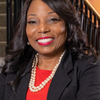Bryan Fisher
Bryan Fisher ran for election for an at-large seat of the Metropolitan School District of Pike Township school board in Indiana. He lost in the general election on November 3, 2020.
Fisher completed Ballotpedia's Candidate Connection survey in 2020. Click here to read the survey answers.
Biography
Fisher was born on September 24, 1983, in Dayton, Ohio. He graduated from Sinclair Community College with an associate degree in 2002. He went on to obtain his bachelor's degree from the University of Dayton in 2006. He also received his J.D. from Florida State University in 2010. Fisher's professional experience includes working as a lawyer.[1][2]
Elections
2020
See also: Metropolitan School District of Pike Township, Indiana, elections (2020)
General election
General election for Metropolitan School District of Pike Township school board At-large (4 seats)
The following candidates ran in the general election for Metropolitan School District of Pike Township school board At-large on November 3, 2020.
Candidate | % | Votes | ||
| ✔ |  | Veronica Ford (Nonpartisan) | 18.5 | 15,349 |
| ✔ |  | Nichole Kelley (Nonpartisan) | 15.0 | 12,430 |
| ✔ | Temeka Lomax (Nonpartisan) | 12.4 | 10,290 | |
| ✔ |  | Larry Metzler (Nonpartisan) | 10.2 | 8,432 |
| Daryl Hill (Nonpartisan) | 9.7 | 8,012 | ||
 | Victor Jackson (Nonpartisan) | 9.5 | 7,918 | |
| Philip Abrams (Nonpartisan) | 9.5 | 7,898 | ||
 | Bryan Fisher (Nonpartisan)  | 9.1 | 7,567 | |
| Patrick Terry Sr. (Nonpartisan) | 6.1 | 5,095 | ||
| Total votes: 82,991 | ||||
 = candidate completed the Ballotpedia Candidate Connection survey. = candidate completed the Ballotpedia Candidate Connection survey. | ||||
| If you are a candidate and would like to tell readers and voters more about why they should vote for you, complete the Ballotpedia Candidate Connection Survey. | ||||
Do you want a spreadsheet of this type of data? Contact our sales team. | ||||
Campaign themes
2020
Ballotpedia survey responses
See also: Ballotpedia's Candidate Connection
Bryan Fisher completed Ballotpedia's Candidate Connection survey in 2020. The survey questions appear in bold and are followed by Fisher's responses.
| Collapse all
I was motivated to run for the school board by a series of conversations with my wife - an elementary school music teacher in the district - about the way that the board currently approached the various stakeholders, and how teachers, in particular, tend to be treated as resources, rather than stakeholders who care about the quality of education they provide to the students.
The other big issue, for me, was the lack of planning for reopening from the Covid-19 shutdowns. There was no cohesive communications and contingency plan for relaying information about cases in the schools and what will happen when there are documented Covid cases at the schools.
My experience and personality are well-suited to finding solutions to challenges, and I plan to do to bring that to the board.- I'm a parent and I'm married to a teacher, so I am dedicated to being a voice for the parents and teachers - the people who know our students (and what they need for success) better than anybody.
- I'm a problem solver and a planner, and I believe that it is imperative that we adapt to the challenges that we are facing - including Covid-19 - with a creative and thorough strategy.
- I am dedicated to serving my community, and I will be a tireless advocate for the interests of Pike Township schools and our students - who are both our future and the reason that our schools exist!
Additionally, I want to see the board establishing policies that help bridge the gaps in funding caused by the reduced enrollment we've seen as a result of Covid. That includes working to establish new community partnerships (and enhance the existing ones), encouraging and equipping teachers to pursue more classroom grants and outside funding for their classes, and lobbying the state legislature on school funding.
Among the people I look up to are:
Saint Mother Teresa, whose devoted life of loving service to her community serves as an example of how to be the change you wish to see in the world
Nikola Tesla, who explored science without fear and with the singular goal of innovation
Justice Ruth Bader Ginsberg, whose devotion to justice and equality is an example that we should all model our lives on
My grandfather, who passed away earlier this year, but was one of the greatest examples of kindness, generosity, and compassion I have known.
Compromise tends to be the biggest dirty word in politics, right now, and it has fed into the crushing partisanship that we are experiencing as a country. People have been convinced to view our political discourse as "us versus them," without realizing that most of us share the same - or very similar - fundamental goals. The only difference is on how we achieve them. But, if we can establish that we actually have common goals, rather than viewing each other as the enemy, then we can start to work towards a compromise that takes the best parts from each side to build a solution that works for everyone.
Among the lessons that it conveys are that we are still learning so much. I didn't realize, until reading this book, that many of the things that we accept as scientific fact - plate tectonics, for example - weren't widely accepted until relatively recent history.
It's also interesting to realize that we have put far more energy into - and arguably learned a lot more from - studying the universe and the vast expanse of space than we have the study of the ground under our feet and the oceans that comprise over 70% of the Earth's surface.
When the board is operating most effectively, they are bringing together all of the voices of various stakeholders to form policies that reflect the best ideas from throughout the school community, and work to establish the best foundation for our students that is possible.
Specifically, the measures that our political leadership has put into place to evaluate success in the school system fail to actually capture effective measures of success or failure. Standardized testing can give a good snapshot, but it doesn't actually give a good perspective of what is going on in the classroom. It doesn't reflect a school's current performance in light of its own past. The result is schools and districts that already perform better than other tend to get rewarded for that, and the schools that have a past of struggling don't get the resources they need to actually improve.
Schools put so much energy into competing on the standardized test - because it's tied to their funding - that they forget to actually teach the children how to do anything but test better.
Note: Ballotpedia reserves the right to edit Candidate Connection survey responses. Any edits made by Ballotpedia will be clearly marked with [brackets] for the public. If the candidate disagrees with an edit, he or she may request the full removal of the survey response from Ballotpedia.org. Ballotpedia does not edit or correct typographical errors unless the candidate's campaign requests it.
See also
2020 Elections
External links
Footnotes










